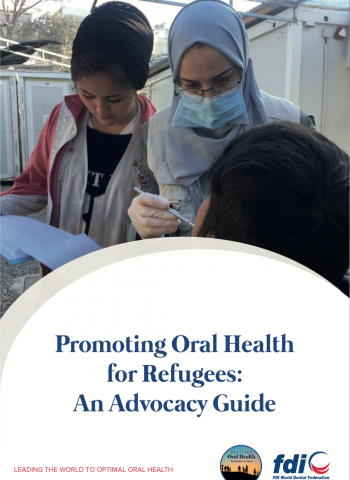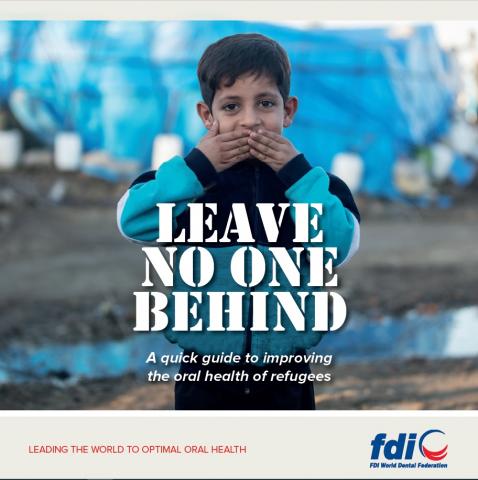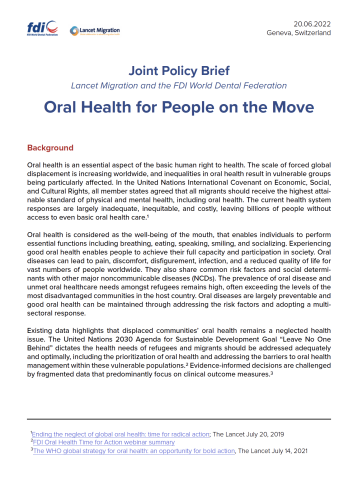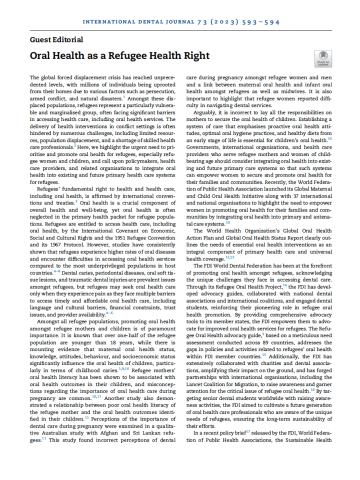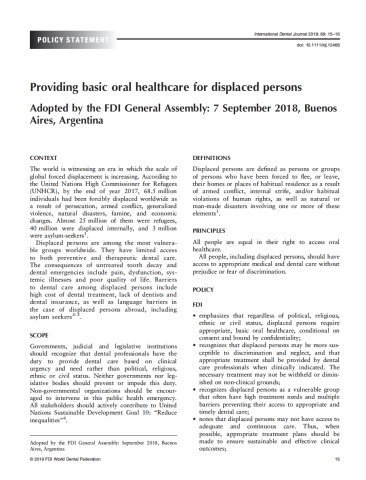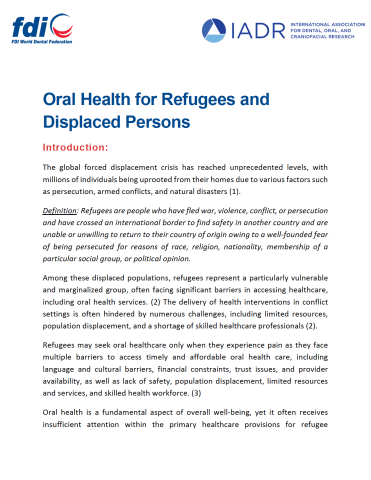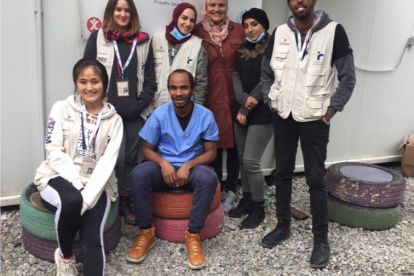Refugee oral health promotion and care project
Some of the most vulnerable people in the world today are those who have been forcibly displaced in the world`s conflict zones. The scale of global forced displacement is increasing worldwide. According to the United Nations High Commissioner for Refugees (UNHCR), by the end of the year 2017 68.5 million individuals had been forcibly displaced worldwide as a result of persecution, armed conflict, generalized violence, natural disasters, famine, and economic changes. Over 25 million of them were refugees, 40 million were displaced internally and 3 million were asylum-seekers1.
The needs of refugees exist in a complex environment, thus, developing a unified approach to deal with all cases of refugees worldwide is a complex task. Refugees usually have limited access to both therapeutic dental care and preventive services. Barriers to dental care among refugees vary and may include treatment costs, lack of dentists and dental insurance, low oral health literacy, language, and other cultural and psychological barriers.
Promoting access to oral care for refugees
The Refugee Oral Health Promotion and Care Project was launched in 2018 and seeks to understand how different countries’ experiences, solutions, and epidemiological data on providing oral care to refugees can be combined to develop a toolkit that will discuss clinical, policy, and societal recommendations and best practices to improve oral health care provision among refugees.
Definition: Refugees are people who have fled war, violence, conflict or persecution and have crossed an international border to find safety in another country and are unable or unwilling to return to their country of origin owing to a well-founded fear of being persecuted for reasons of race, religion, nationality, membership of a particular social group, or political opinion.

Goal 1
Develop a guide that discusses clinical, policy and societal recommendations and best practices that can be used to influence existing legislation to provide dental care services to refugees
Goal 2
Strengthen the infrastructure of oral health services offered to refugees by increasing access to tertiary dental services
Goal 3
Support preventive and therapeutic interventions that may improve oral health among refugees by building capacity among health care and community workers
Improving the oral health of Rohingya refugee children in the Ukhiya camp through prevention and effective management of disease
Background
Since 2017, approximately 750,000 Rohingya refugees have been forced to flee their homes in Myanmar to escape persecution and violence. Nearly all have sought shelter in refugee settlements in Cox’s Bazar, Bangladesh – the world’s largest refugee camp. The needs of this population, including their health needs, are high as the enormous influx is causing pressure on the Bangladeshi host community.
At present the international community does not have a comprehensive plan to address the health needs of this new wave of global migration, and almost nothing is known about their oral health needs. It is a known fact that dental caries affects most adults and 60–90% of schoolchildren worldwide, which has a detrimental effect on a child’s quality of life, growth, and development, and can have severe consequences including dental sepsis. To tackle this issue, FDI has joined the efforts of the Refugee Crisis Foundation (RCF) to provide emergency dental treatment for the Rohingya refugees in Bangladesh. Their data highlights that 47% of refugees report having ‘poor’ mouth condition, and 4 in 5 patients reported pain and difficulty eating. The burden of disease is very high in the refugee population due to the limited access to oral healthcare services in refugee camps.
The need to deliver educational and preventive interventions to improve the oral health of children and correct unhealthy habits is vital.
Objectives
The overall goal of this project is to shift from an intervention-focused model of oral health to a more preventive approach, aimed at reducing the increasing burden of oral disease through community engagement and promotion of good oral health.
The second objective is to provide comprehensive hygiene education, including important practices such as handwashing, the most powerful hygiene behaviour to prevent infectious diseases, and toothbrushing, the most basic and effective action to maintain good oral health. Instilling healthy hygiene habits at an early age is a crucial step that contributes to healthy development and reduction of preventable diseases.
Finally, the application of Silver Diamine Fluoride (SDF), which is a low-cost, effective method for addressing dental caries in young children.
This project integrally contributes to the Sustainable Development Goal (SDG) 3 on health and well-being, SDG 4 on quality education, SDG 5 on gender equality, and SDG 6 on clean water and sanitation.
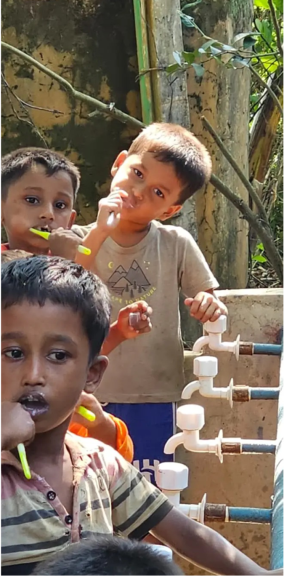
Improving access and delivery of oral healthcare for Afghan refugees in Pakistan
FDI World Dental Federation in collaboration with Pakistan Dental Association (PDA)
Background of the project
The urgency to provide proper oral health services to the underserved Afghan refugees persists mainly due to inadequate access, lack of financial resources, and low levels of awareness about the consequences of poor oral health.
Pakistan currently hosts approximately 1.3 million registered refugees, making it one of the largest refugee-hosting countries globally.[1] 26,716Afghan refugee families (130,746 individuals) reside in Karachi. Unfortunately, this community lacks dental hospitals in the vicinity, compelling residents to seek treatment in poor hygiene facilities with improper techniques.
Early detection and diagnosis, prevention and prophylactic treatments, as well as on-time intervention are essential to address the burden of most oral diseases and conditions.
Objectives
With the main goal to improve the oral health of the refugee population in Afghan Basti, a refugee camp in Karachi, the project aims to:
1. conduct a comprehensive pathfinder survey to provide a need assessment report based on oral disease prevalence among Afghan refugees
2. establish the concept of a dentist-led team approach in primary oral healthcare settings for Afghan refugees
3. facilitate accessibility for tertiary care dental treatment services free of cost for Afghan refugees to close the gap
4. develop and train Associate Dental Professionals (dental health coordinators) within the refugees
References
1. Afghan refugees in Pakistan by province. UNHCR Data Portal. [Accessed 15 January 2024]. Available from: https://data.unhcr.org/en/country/pak
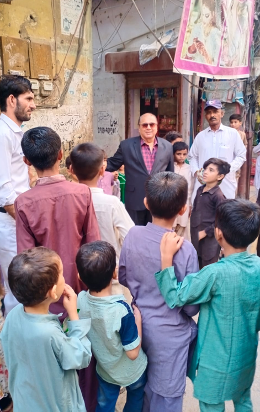
In line with one of the objectives of FDI Vision 2030 to promote oral health for vulnerable populations, FDI’s Public Health Committee has been developing materials and generating guidance information for refugees and people on the move in the past few years. Thus, we have collected data from FDI members to understand the level of knowledge and involvement in promoting refugee oral health. An advocacy guide was developed to support National Dental Associations to build promotional strategies.
In 2022, a policy brief in collaboration with The Lancet Migration was published, calling on Governments and key stakeholders to improve oral health for people on the move. In 2023, another policy brief has been published on the right of refugees to access oral health services. The joint policy brief was developed in collaboration with WFPHA (World Federation of Public Health Associations), SHEM (the Sustainable Health Equity Movement), and FCGH (the Framework Convention on Global Health Alliance).
RESOURCES
RELATED NEWS
1. United Nations High Commissioner for Refugees. Global Trends: Forced Displacement in 2020 .

